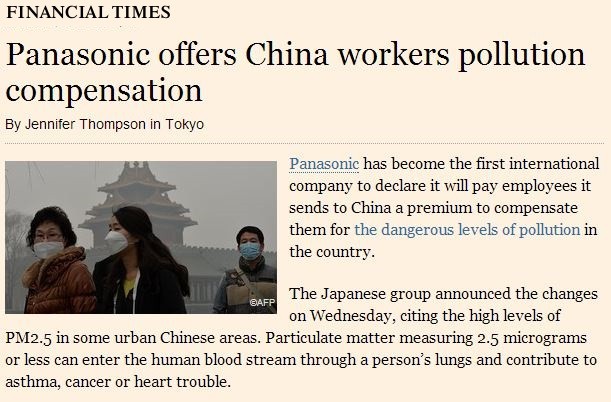
Panasonic has become the first international company to declare it will pay employees it sends to China a premium to compensate them for the dangerous levels of pollution in the country.
The Japanese group announced the changes on Wednesday, citing the high levels of PM2.5 in some urban Chinese areas. Particulate matter measuring 2.5 micrograms or less can enter the human blood stream through a person’s lungs and contribute to asthma, cancer or heart trouble.
Employees sent to China by Panasonic typically receive a more generous remuneration package because it is classed as a “hardship posting”, but until now no explicit mention has been made of growing concern over the dire air quality in the country.
Unrelenting smog has become a focus for public discontent, particularly in prosperous urban areas such as Beijing, which in February experiences a week-long stretch of “hazardous” air, the worst level on China’s air quality index. It has also been cited by expatriates as one of the main reasons for leaving the country.
The company did not disclose the number of Japanese employees in China covered by the scheme or the amount they will receive. Chinese employees already living in the country will not receive the extra payment.
Other companies have been quietly increasing the benefits they offer to expat staff over the past year but Panasonic is the first to publicly acknowledge the problem and offer an allowance to compensate employees who agree to relocate to China.
“That’s the first time I’ve heard any company be quite so brazen about it,” said Robert Parkinson, head of Beijing-based recruiter RMG Selection. “The normal style would be to dress it up as a ‘developing country allowance’.
“It’s a bit like saying we know we are exposing you to something that could be life-threatening. We’re going to admit it and compensate you for it.”
At the opening of China’s parliament last week, Premier Li Keqiang said his government would wage “war on pollution”. Days later an official analysis of 74 Chinese cities revealed that only three met national air quality standards.
The issue has gained more international attention since 2008 when the US embassy installed a pollution monitoring system on its roof in Beijing to detect the level of PM2.5.
The government has made some efforts to clean up polluting factories and steel mills and has also pledged to try and limit the number of cars on the country’s roads. Last year it outlined a plan to cut emissions and polluting steel capacity in the populous east, but attempts to regulate pollution are difficult given the country’s reliance on coal burning.
For many expatriates the extreme levels of pollution and its impact on daily life have already convinced them to leave. Many western embassies in Beijing started providing air filtering machines for their diplomats in 2014 as it became increasingly difficult to convince qualified people, especially those with small children, to move to the Chinese capital.
Article shared from FT page: http://www.ft.com/intl/cms/s/0/9567823e-a9b3-11e3-adab-00144feab7de.html#axzz2vou41nWU